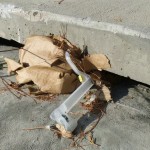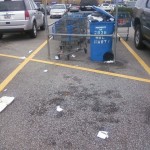 Walmart is the largest retailer in the world that sells the products that become litter along our waterways and on our beaches. Walmart stores themselves also directly contribute to the litter problem. Because of the number of customers and employees outside their stores every day, Walmart’s direct litter contribution can only be estimated to be in millions of pieces.
Walmart is the largest retailer in the world that sells the products that become litter along our waterways and on our beaches. Walmart stores themselves also directly contribute to the litter problem. Because of the number of customers and employees outside their stores every day, Walmart’s direct litter contribution can only be estimated to be in millions of pieces.
On a Walmart lot, you will find sewers that empty directly into rivers and creeks without grating to trap the waste and prevent it from entering the water stream. Off the Walmart property, you will find single-use plastic bags hanging in trees and shrubs and every type of ground litter imaginable. Since 90% of all Americans live within 15 miles of a Walmart store, almost every American is negatively impacted by Walmart-generated litter.
In 2005, Walmart made a commitment to reduce the environmental impact of the products they sell. Reduced packaging is the main focus of this campaign. The biggest benefit however is to Walmart itself and not the environment It will reduce the size of the littered pieces but not the number of pieces being littered. Walmart benefits because of reduced shipping costs and increased shelf space that smaller packages require.
Reduced packaging is the main focus of this campaign. The biggest benefit however is to Walmart itself and not the environment It will reduce the size of the littered pieces but not the number of pieces being littered. Walmart benefits because of reduced shipping costs and increased shelf space that smaller packages require.
Walmart works hard to portray itself as patriotic, but despite its Buy American campaign, 80% of its hard goods merchandise is still manufactured in China. However, based on my observations, 80% of waterway litter comes from its American suppliers. Single-use plastic bags, plastic beverage bottles and cans, Styrofoam coolers, and cigarettes are all manufactured in the United States.
Walmart touts itself as being a green, environmentally friendly company, but if you look closely most of these efforts and the general focus of the company itself are self-serving and centered around cutting costs to help increase their overall profit. Things like cutting energy and water usage translate  to immediately decreasing overhead costs and increasing bottom-line profits. No doubt reducing their carbon footprint and water usage will benefit the environment, but as a for-profit company, their focus is on increasing net profit and the performance bonus for their CEO, Mike Duke.
to immediately decreasing overhead costs and increasing bottom-line profits. No doubt reducing their carbon footprint and water usage will benefit the environment, but as a for-profit company, their focus is on increasing net profit and the performance bonus for their CEO, Mike Duke.
Cleaning up Walmart-generated litter will not increase their profitability and therefore is not a funding priority. We have tried.
After Wounded Nature–Working Veterans had spent days recruiting volunteers, preparing a media list, and writing out a press release for Walmart’s approval, Andrea sent an email telling us to cease on all fronts. “She informed us that the head of US Store Operations and the Division SVP for the Southeast region of the country did not want to open another date on their register collections calendar to fund a litter clean-up boat using veterans” states Rudy Socha, CEO of Wounded Nature–Working Veterans.
“When Walmart states they have donated or spent time and money correcting a problem, the public and reporters should ask ‘How much did Walmart spend on that?’” Remember Walmart is a retailer that generated 440 billion dollars in gross sales last year and paid its CEO 18.1 million dollars. Bear those numbers in mind when evaluating Walmart’s stated commitment to address a problem.

Wounded Nature–Working Veterans would like to hear from you. Do you shop at Walmart? Would you be willing to donate to support a “Walmart” boat to clean up litter along our waterways and staffed by veterans? Do you think Walmart should fund/brand a clean-up boat? You can send your reply directly to Wounded Nature-Working Veterans CEO, Rudy Socha.
